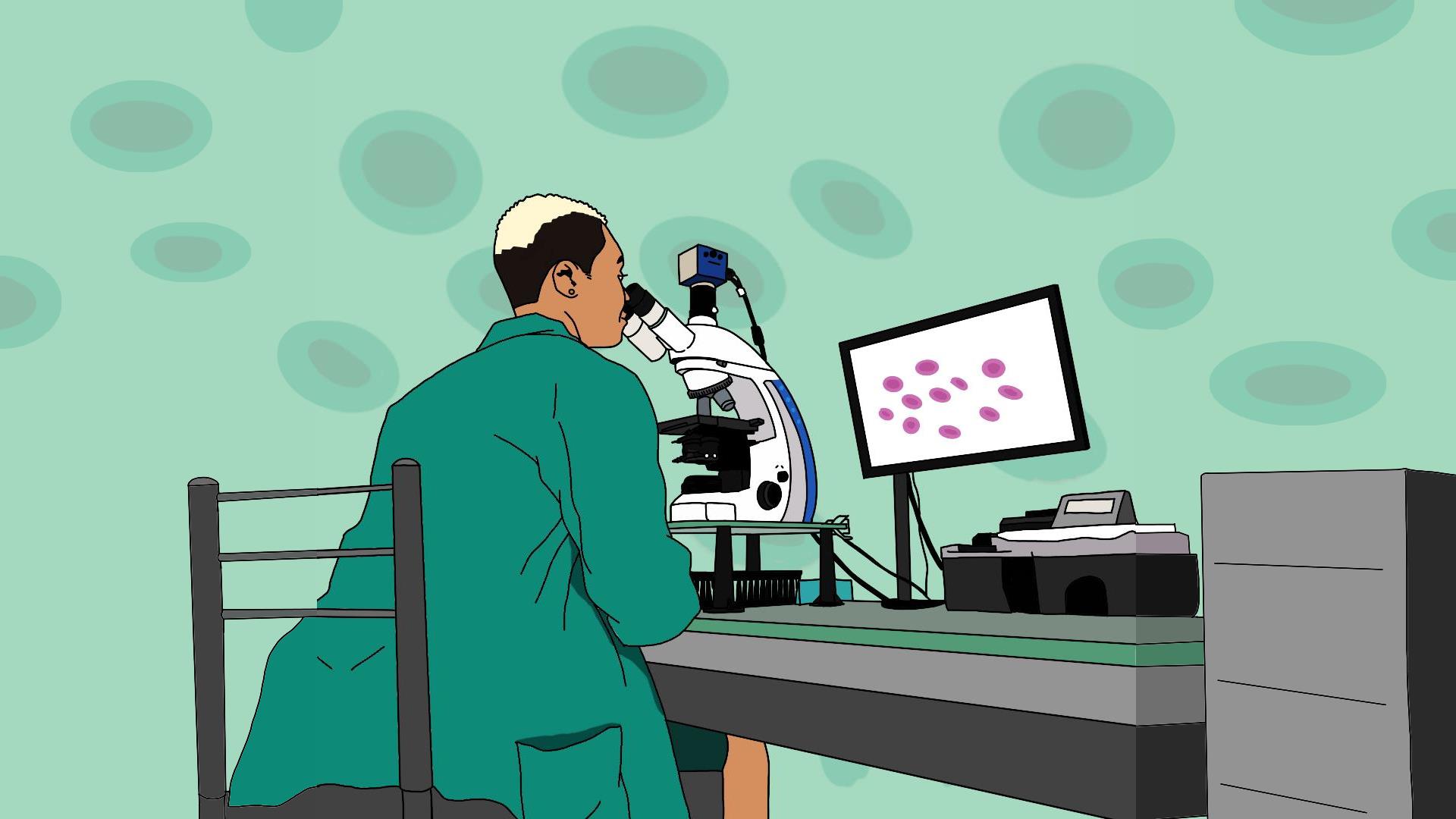🎧 Listen to: Blood Cell Disorders

Blood Cell Disorders
What are blood cell disorders?
Blood cell disorders are health conditions that affect the components of your blood—red blood cells, white blood cells, or platelets. These cells are made in your bone marrow (the soft tissue inside your bones) and each plays a vital role:
- Red blood cells (RBCs) carry oxygen from your lungs to the rest of your body.
- White blood cells (WBCs) help your body fight infections.
- Platelets help in blood clotting when you get a cut or injury.
When something goes wrong with any of these cells, it can lead to serious health problems.
How common are blood cell disorders in Africa?
Blood-related diseases are common in Africa due to genetic, nutritional, and environmental factors. Some important statistics include:
- Sickle cell disease affects about 1 in every 4 west Africans and is one of the most common genetic disorders on the continent.
- Anaemia due to iron deficiency is widespread, affecting over 50% of pregnant women and young children in sub-Saharan Africa.
- Malaria, a leading cause of red blood cell destruction, is responsible for hundreds of thousands of deaths yearly.
Many people suffer from these conditions without knowing, making awareness and early diagnosis critical.
Symptoms of blood cell disorders?
The symptoms depend on which type of blood cell is affected:
Red blood cell disorders (e.g., anaemia, sickle cell disease)
- Fatigue and weakness
- Shortness of breath
- Dizziness or difficulty concentrating
- Rapid heartbeat
- Pale or yellowish skin (jaundice in severe cases)
White blood cell disorders (e.g., leukemia, lymphoma, chronic infections)
- Frequent infections
- Unexplained weight loss
- Constant tiredness
- Fever or night sweats
Platelet disorders (e.g., haemophilia, Von Willebrand disease)
- Easy bruising
- Unexplained nosebleeds or bleeding gums
- Cuts that take too long to stop bleeding
Common blood cell disorders in Africa?
Red blood cell disorders
- Sickle cell disease (SCD)
- This genetic disorder affects red blood cells, making them shaped like sickles instead of round.
- The sickle-shaped cells block blood flow, causing severe pain, organ damage, and even strokes.
- It is common among Africans, especially in Ghana, Nigeria, and Congo.
- Prevention: Newborn screening and early treatment can help manage the disease.
- Iron deficiency anaemia
- Caused by lack of iron in the diet, heavy menstrual bleeding, or chronic infections like malaria.
- It leads to fatigue, dizziness, and pale skin.
- Prevention: Eat iron-rich foods like leafy greens, beans, meat, and fish. • Thalassemia
- A genetic condition that leads to defective haemoglobin production.
- It can cause severe anaemia, bone deformities, and growth problems in children.
White blood cell disorders
- Leukaemia (blood cancer)
- Affects white blood cells, leading to uncontrolled cell growth.
- Symptoms include frequent infections, weight loss, and night sweats.
- Requires early diagnosis and treatment.
- Lymphoma
- Affects the body’s lymphatic system (a part of the immune system).
- Can cause swollen lymph nodes, fever, and extreme tiredness.
Platelet disorders
- Haemophilia
- A genetic condition that prevents blood from clotting properly.
- Even minor cuts or injuries can cause excessive bleeding.
- Treatment: Special clotting factor injections.
- Thrombocythemia
- Causes excessive blood clotting, increasing the risk of stroke and heart attacks.
How are blood cell disorders diagnosed?
If you suspect you have a blood cell disorder, visit a doctor or hospital for:
- Complete blood count (CBC) test: Checks the levels of red and white blood cells, and platelets.
- Bone marrow test: Helps detect cancers like leukaemia.
- Genetic tests: Used for inherited conditions like sickle cell disease.
How can blood cell disorders be treated?
Treatment depends on the condition, but common options include:
- Medications: Iron supplements for anaemia, antibiotics for infections, or chemotherapy for blood cancers.
- Blood transfusions: Common for severe anaemia and sickle cell disease.
- Bone marrow transplants: Used for leukaemia and some genetic disorders.
- Healthy diet and lifestyle: Eating nutritious foods, drinking clean water, and avoiding infections can help prevent complications.
How can you prevent blood cell disorders?
While some conditions are inherited and cannot be prevented, you can reduce your risk by:
- Eating a balanced diet rich in iron, vitamins, and proteins (e.g., spinach, kontomire, beans, fish, and eggs).
- Taking folic acid and iron supplements during pregnancy to prevent birth defects and anaemia.
- Screening for sickle cell disease before marriage to avoid passing it to children.
- Preventing infections by taking vaccines (e.g., for malaria and hepatitis) and practicing good hygiene.
- Seeking medical attention early if you notice unusual fatigue, bruising, or prolonged bleeding.
Final thoughts?
Blood cell disorders are serious but manageable with proper care. Many people in Africa live healthy lives with conditions like sickle cell disease and anaemia by taking the right precautions. Understanding your health and seeking early treatment can save your life or that of a loved one.
If you experience any of the symptoms mentioned, visit a healthcare provider for testing and advice. Your health matters.
